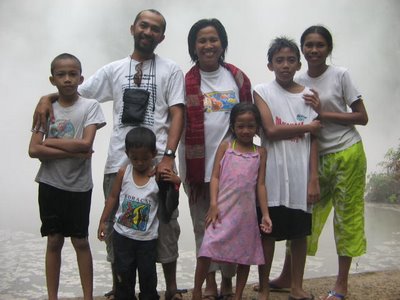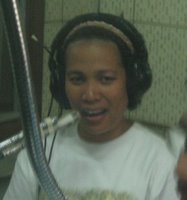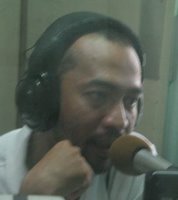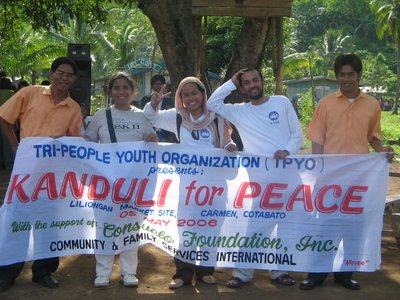[Fr. Peter Geremia, PIME, is an Italian-American missionary who has worked in Mindanao since 1977. In 1985 Fr. Peter was targeted for assassination by right-wing vigilantes, who instead killed his friend Fr. Tulio Favali. Fr. Peter’s name appears on military blacklists now being circulated. So did George’s.]
George & Maricel Vigo: United in love, in commitments and in death.
George and Maricel Vigo came to visit me on June 19, 2006, just before being killed. Of course they didn’t envision a violent death on that day. They didn’t even mention threats or issues. They focused on their own personal and family concerns. It was a sort of renewal of their personal relationship and their deepest commitments.
After our long sharing they walked away holding hands like young lovers. They looked as if that was the happiest moments of their life, a peak experience. They poured out so much affection that I was amazed.
As they rode home, they were shot down like birds flying in the sky.
A couple of days later I saw a picture on top of their coffin. They were standing together by Lake Agco, the magic lake near the peak of Mt. Apo. That’s where the tribal leaders held their ritual, the D’yandi or Blood Compact, vowing to defend the sacred mountain, which they call Apo Sandawa, “to the last drop of their blood." On that spot George and Macel made their own vow to one another and to the oppressed. When I saw that picture I could feel the vibration of their burning love for one another, for the oppressed, for nature, for the values of peace and justice.
Why didn’t the spirits of Nature warn them about the immediate danger to their life? Their 13-year-old son would ask, “Why were they sacrificed like innocent lambs?” I could not protect them; maybe I added to the risks they were facing. God certainly knew what was about to happen. They were chosen for the special privilege of becoming martyrs.
Those who plan to kill them knew what was happening. How many saw that horrible murder coming and did not stop it? How can they live with their conscience now? How can they look at their children and see the children of George and Macel, like shadows in the dark?
"A NEW WAVE OF VIGILANTISM AND FANATICISM IS SWEEPING THE PHILIPPINES. TRUE DEMOCRACY IS BEING SUFFOCATED BY BLOOD AND FEAR."
They showed they can kill even a women in a public place without any fear of being stopped, as if they have a license to kill. Some say this is a warning to all activists. It is the season for hunting down popular community leaders. They say it is a national campaign funded by the masterminds of the war on terrorism, or better, the war of terror.
This is the sickness of vigilantes and fanatical groups—like when Fr. Tulio Favali was killed during Martial Law. They think atrocities will make them more powerful. And they are masters of deceit. In fact, the official investigators deceived Macel's mother to sign a statement attributing the killing to New People's Army (NPA). They accused George and Macel of supporting the NPA, then they blame the rebels for their killing. They also blame the rebels for Favali's murder, but gradually the truth was revealed by witnesses who overcame fear and threats, sustained by solidarity of many supporters who took a stand—"tama na, sobra na."

George and Macel grew up during the last years of Martial Law. During their student years they joined our Task Force Apo Sandawa, an alliance of church groups, NGO’s, and Peoples Organization (PO) committed to protecting the environment of the Indigenous People (IP) and all the oppressed sectors. They both served in the Diocesan programs, Tribal Filipino Program (TFP), and Justice and Peace Integrity of Creation Program (JPIC). Then they found jobs in various NGOs to support their growing family.
Both of them joined the Federation of Reporters for Empowerment and Equality (FREE) and they struggled to launch a local paper called “Apo Sadawa”, then a second paper called “Headliner”. In 2001 the offices of Headliner was burned to the ground, suspected arson attack because of their reporting. George was also involved as a local producer for a number of BBC World Service radio and television documentaries and features. He also helped produce Islands Under Seige, which aired on America’s most respected documentary program, Frontline. George became a UCAN correspondent which stands for Catholic Asian News. Their voices became familiar to the public in the local radio stations and as a journalist they constantly projected the voice of the poor, oppressed, exploited and struggling masses.
Since the time of the All Out War in the year 2000, which raged around us here, they were among the most active Peace Advocates joining in human rights investigations, relief and rehabilitation missions, peace rallies, and so on. In particular they proposed and formed a group called Kids for Peace, bringing their own children together with others to express their expectations for peace.
They became very much involved in promoting pro-people politics through education and grassroots organizing. In 2004 they were among the conveners of KALAMPAG- Kotobatenyos for Good Government, an alliance of POs, NGOs, church-based and civic groups of concerned citizens who promote “a style of leadership respectful of all our people and to heal the wounds of the victims of abusives”.
We wonder if they became targets because of their participation in KALAMPAG or because of all their community involvements. They were considered moderate activists, journalists working within the system—young professionals who cared deeply for family and community values.
George often introduced himself as my ‘junior’, implying that he wanted to continue my way of serving the people around us. Macel always shared her deepest secrets. Now I feel their deaths are also my death, like when Fr. Favali was killed in my place.
They can kill people like George and Macel, like Favali and other martyrs, but they cannot kill our dreams and commitments. As it happened with Christ, he was condemned and crucified but he rose to new life and he promised that all those who follow his way of the cross will experience resurrection. Maybe we cannot yet see how our communities and our nation can develop the new life of the resurrection, but I believe it is being generated like a seed underground, watered by the blood of martyrs. Those who share their spirit and their passion for truth and justice, for peace and solidarity, will continue their struggle.
"OUR TRIBE IS DECREASING. SO MANY PROGRESSIVE LEADERS HAVE BEEN KILLED, OTHERS PARALYZED BY DEATH THREATS"
Our tribe is decreasing. So many progressive leaders killed, others paralyzed by threats, particularly here in Kidapawan. The worst trend is the indifference of the majority—from the authorities to academics, even churches and NGOs—who appear to have lost their prophetic voices. The majority of the media are used by the masterminds of deception. Even the Department of Justice and the courts make a mockery of the system of justice.
As a result a new wave of vigilantism and fanaticism is sweeping the land, and true democracy is being suffocated under blood and fear. Some say that, because of the pervasive influence of consumerism, the culture of corruption promoted by the media and internet, the commercialization of vices and the make-belief world of entertainment, many people are prevented from facing reality. Thus many families break down, the young are alienated, and very few leaders can be credible to the masses of the oppressed. Maybe now the victims or the martyrs can become the new models for the counter culture that can heal the wounds of violence and generate new Peace Advocates like George and Macel.









